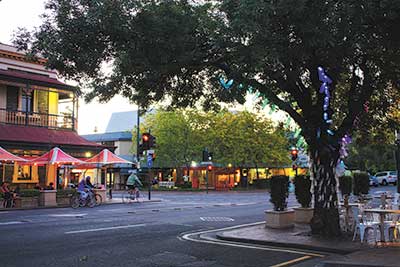Adelaide has recently developed and adopted its own Placemaking Strategy, which provides the framework to support the creation of ‘One City, Many Places’ and enhances Adelaide’s reputation as one of the world’s great small cities.
It seeks to develop empowered communities and strong partnerships.
This includes creating inclusive and open governance arrangements that encourage the Adelaide community, businesses and interest groups to work with the Council to produce positive outcomes for the city, district or place.
In 2011, Adelaide City Council (ACC) first approached small businesses, entrepreneurs, community and resident groups to create Splash! Adelaide, a temporary activation program.
During its first year the CBD came alive with around 30 extra community driven funky events including pop-up playgrounds, a roller derby, a twilight street party, and night markets at an investment of about $150,000.
Fast forward three years and for the same budget there are around 100 events scheduled, and interest and ideas for activation are only getting stronger, and a formal Placemaking Strategy has been implemented.
Adelaide and its ‘place users’ are undertaking three place pilots over the next two years.
The pilots seek to experiment with new ways of operating using temporary approaches similar to Splash Adelaide, as well as identifying permanent and longer term actions.
Melbourne Street, North Adelaide, is one of ACC’s three placemaking pilot areas.
Already pockets of energy can be seen emerging in the street as local business owners, traders, residents and visitors begin to work together with Council and other stakeholders in creating a sense of place.
The success of the recent North Adelaide ‘Wishing Tree’ project, which invited the local North Adelaide community to voice their ideas, dreams and plans surrounding the future of Melbourne Street through arts group Community Arts in Place, is a shining example of placemaking in practice.
Collected ‘wishes’ were placed into 300 plastic bottles before being strung up and illuminated in a ‘wishing tree’ along Melbourne Street, creating a new visual effect for the area.
Café owners, including Amanda Matulick from E for Ethel, along with Community Arts in Place artists and other Melbourne Street traders are pleased with the result.
Amanda says placemaking is a great way to get businesses, residents and visitors connected to the places around and drive creativity.
“I make the most of every opportunity, showing works by local artists in my café being included in community driven activities.
“I’m a big believer in making my business part of my community and like to lead by example.
“By creating and encouraging opportunities for people in the community to engage with what’s going on, even if it’s just for a chat, our ties are strengthened and this becomes part of our way of life.
“Place identity really helps everyone become part of the solution and own their contribution to the space which can be shared with everyone around them.”
Placemaking empowers the community to use and improve spaces and transform them into places for doing business, socialising, to learn from one another and enjoy time together.
This is a great example of what can happen when local government opens itself up to doing business differently.
The results and rewards ACC are seeing are built on trust, which, now it’s starting to be established, is encouraging more and more ideas to flow in.
The real value of the temporary activation program is in its teaching of Council as an organisation that it, as a government, can work in a very different way with the community despite the constraints of probity and all the rules and other considerations.
Placemaking in various forms can also be seen in other parts of the world and a good example of this is post-earthquake Christchurch New Zealand where an organisation known as Gap Filler has worked hard to activate underused and empty blocks around the city.
Two members of the Gap Filler team were in Adelaide recently to host community sessions with locals and show examples of their work to activate Christchurch and encourage the community to take ownership of their city.
The Gap Filler sessions served to inspire and encourage the people of Adelaide to seek support from Council to take ownership of and activate the spaces, places and activities around them with some wonderful ideas on which to build.

















